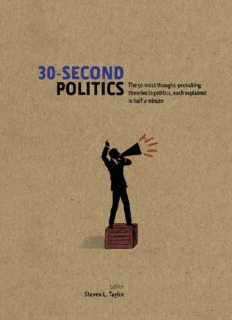
30-Second Politics: The 50 most thought-provoking ideas in politics, each explained in half a minute PDF
Preview 30-Second Politics: The 50 most thought-provoking ideas in politics, each explained in half a minute
30-SECOND POLITICS The 50 most thought-provoking theories in politics, each explained in half a minute Editor Steven L. Taylor Contributors Michael Bailey Elizabeth Blum G. Doug Davis Christopher N. Lawrence Feng Sun Steven L. Taylor Gregory Weeks First published in the UK in 2012 by Icon Books Ltd Omnibus Business Centre 39–41 North Road, London N7 9DP email: [email protected] www.iconbooks.co.uk © 2012 by Ivy Press Limited The editor and contributors have asserted their moral rights. No part of this book may be reproduced in any form, or by any means, without prior permission in writing from the publisher. This book was conceived, designed and produced by Ivy Press 210 High Street, Lewes East Sussex, BN7 2NS, UK www.ivypress.co.uk Creative Director Peter Bridgewater Publisher Jason Hook Editorial Director Caroline Earle Art Director Michael Whitehead Designer Ginny Zeal Concept Design Linda Becker Illustrator Ivan Hissey Profiles & Glossaries Text Steve Luck Senior Editor Stephanie Evans Project Editor Jamie Pumfrey Digital Assistant Emily Owen ISBN: 978-1-848313-27-6 CONTENTS Introduction The Basics: Who Governs? GLOSSARY Monarchy Despotism Aristocracy profile: Aristotle Oligarchy Democracy Popular Sovereignty Authoritarianism Class Conflict Rule by the Few GLOSSARY One-Party Rule Fascism profile: Benito Mussolini Nazism Totalitarianism Patrimonialism Praetorianism Theocracy Rule by the Many GLOSSARY Anarchism Representative Democracy Majoritarianism Proportional Representation Classical Liberalism profile: John Locke Conservatism Liberalism Libertarianism Social Democracy Elements of Democracy GLOSSARY Legislative Power Executive Power Judicial Power Separation of Powers profile: Charles-Louis de Secondat, Baron de Montesquieu Checks and Balances Parliamentary Democracy Federalism Unitary State Communism GLOSSARY Communism Marxism profile: Karl Marx Leninism Maoism Anarcho-Syndicalism Political Economy GLOSSARY Capitalism Socialism Globalization Keynesianism Mercantilism Neoliberalism profile: Ayn Rand Objectivism International Relations GLOSSARY Realism profile: Hans Morgenthau Imperialism Neoconservatism Nationalism Environmentalism Constructivism Appendices Notes on contributors Resources Index Acknowledgments INTRODUCTION Steven L. Taylor Much to the delight of political scientists everywhere, Aristotle once described the study of politics as the ‘master science’. Of course, he did not do so for the purpose of boosting the egos of a bunch of academics, rather he was expressing the notion that studying the interactions of human beings within the confines of political life encompassed the study of practically everything. While perhaps a grandiose formulation on the one hand, on the other consider the following set of issues that fall under the general rubric of politics: war and peace, criminal justice, taxation, safety regulations, civil rights and liberties, trade, abortion, marriage and rules governing scientific enquiry (to name but a few). Given the significance of these types of issues, the rules and structures governing their contents and application directly shape our lives. Put another way: one’s daily existence would be very different if one was born in North Korea versus in the South in terms both of material conditions as well as in the realm of rights and privileges. In short: politics matters. This book seeks to be an aid in sorting out the complexity of the political world and the language associated with it. Aristotle provides a good place to start such a discussion, as he created a simple yet useful typology for classifying regime types by looking at the question of who governs: the one, the few or the many. This approach forms the foundation of the opening chapters of this book. The first chapter, Who Governs?, details what government by the one, few or many might look like in basic terms. The second, Rule by the Few, goes on to examine specifically regimes wherein the one or the few govern, or what we would call in modern parlance authoritarian regimes. From there we move to the question of Rule by the Many – in other words, democratic regimes. This third chapter details the basics of democratic governance while the fourth looks specifically at key elements of governance, especially of a democratic nature, through the prism of the work of Montesquieu, the French philosopher who heavily influenced the writers of the United States Constitution. Since democracy is the dominant form of government globally at the moment (even if imperfectly executed), more time is devoted to that general topic than any other. Proportional representation How can we translate multiple interests in society into acceptable public policies? Democracy tries to do this, even if it does it imperfectly. The various communist theories are considered next. While it is true that, save for a few exceptions, communism is a dead regime type, the concepts are still relevant to political discourse as the terminology remains with us (not to mention that the current world order was shaped in large part, until only a few decades ago, by these ideas). Beyond basic regime types and theoretical schools of thought, other elements bear consideration. One is the clear connection between politics and economics, and hence the penultimate chapter, Political Economy, deals with a number of interrelated issues. Another key focus for the study of politics is the question of why states go to war and why they make peace. As such, the final chapter details some key terms and concepts in the realm of international relations. The book provides a lengthy menu of items to sample, yet it offers only a taste of each. Hopefully such samples will inspire further thought, reading and research. Globalization A key political challenge in the current era is that we are all becoming increasingly interconnected.
